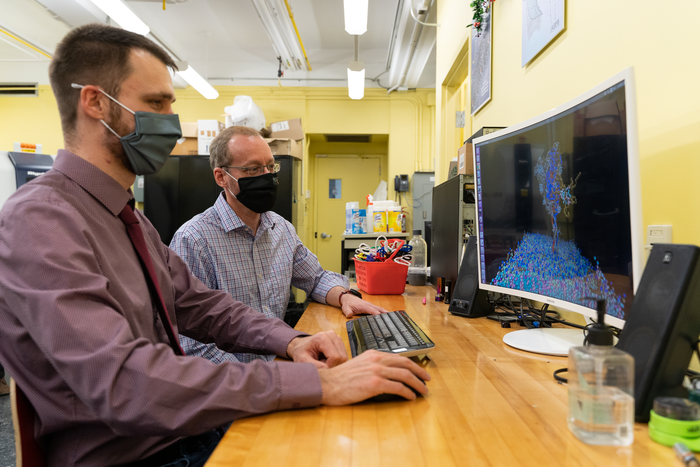Hamilton, ON, Mar. 11, 2022— Physicists, chemists and immunologists at McMaster University have teamed up to modify red blood cells to transport viral agents which can safely trigger the immune system to protect the body against SARS-CoV-2, creating a promising new vehicle for vaccine delivery.

Credit: Matthew Clarke/McMaster University
Hamilton, ON, Mar. 11, 2022— Physicists, chemists and immunologists at McMaster University have teamed up to modify red blood cells to transport viral agents which can safely trigger the immune system to protect the body against SARS-CoV-2, creating a promising new vehicle for vaccine delivery.
Developing new strategies and vaccine technologies is critical for controlling the pandemic and preparing for future outbreaks as the coronavirus continues to evolve and mutate, say the researchers.
The new method, described in the journal PLOS ONE is an entirely unique approach to vaccination. Red blood-cell membranes are embedded with SARS-CoV-2 spike proteins, which then form virus-like particles.
“We take red blood cells and remove everything from the inside. We then attach spike proteins to their outside to mimic a corona virus”, explains graduate student Isabella Passos-Gastaldo, a lead author on the paper.
The particles, shown to activate the immune system and produce antibodies in mice, are completely harmless.
“Current vaccine delivery methods often cause drastic immune system reactions and have short-lived responses,” says Maikel Rheinstadter, a senior supervisor on the paper and a professor in the Department of Physics & Astronomy at McMaster.
“Some of the vaccines that have been developed have shown side effects. This delivery platform opens new possibilities for vaccines and therapeutics,” he says.
The researchers found cells can be loaded with a large dose of viral proteins, yet likely produce few side effects, making the new method more tolerable and effective than other vaccine options.
“We have developed a method where we can trigger an immune response without the use of genetic material and yet we are able to synthesize these particles in a very short amount of time,” says Sebastian Himbert, lead author on the study and a recent graduate student in the Department of Physics & Astronomy at McMaster.
The technology can be quickly adapted to develop vaccines for variants or new viruses that may emerge in future.
“This is the kind of creative, interdisciplinary research that McMaster is known for. It was exhilarating working with physicists, structural biologists and immunologists to design a radically different vaccine platform,” says Dawn Bowdish, Professor of Medicine at McMaster and Canada Research Chair in Aging & Immunity and co-author of the paper.
The researchers first reported this technique in 2020, when they modified red blood cells to deliver drugs throughout the body, which could then target infections or treat catastrophic diseases such as cancer or Alzheimer’s.
“This platform makes our own blood cells smart in many different ways,” explains Rheinstadter. “In this case it’s a vaccine. We are using our own cells much like nano robots inside of our bodies and whenever they see a disease, they can fight it.”
-30 –
For more information please contact:
Michelle Donovan
Media Relations
McMaster University
905-512-8548 (c)
[email protected]
Wade Hemsworth
Manager, Media Relations
McMaster University
289-925-8382 (c)
[email protected]
Journal
PLoS ONE
Method of Research
Experimental study
Subject of Research
Animal tissue samples
Article Title
Erythro-VLPs: Anchoring SARS-CoV-2 spike proteins in erythrocyte liposomes
Article Publication Date
11-Mar-2022




